Why Your Pellet Grill Keeps Shutting Off Mid-Cook. Did you know that over 30% of pellet grill users face unexpected shutdowns during cooking? These interruptions can ruin a perfectly planned meal and leave grill owners frustrated. Understanding the root causes is essential to ensure smooth and consistent performance.
Common issues include temperature fluctuations, pellet feed irregularities, and power supply problems. For instance, power outages lasting more than 30 seconds can extinguish the fire, requiring a complete restart1. Similarly, damp wood pellets can jam the auger, preventing proper operation2.
This guide aims to help users identify and troubleshoot these problems. By addressing factors like ash buildup, pellet quality, and electrical issues, grill owners can enjoy uninterrupted cooking sessions. Regular maintenance and understanding the grill’s mechanics are key to preventing shutdowns.
Why Your Pellet Grill Keeps Shutting Off Mid-Cook
Key Takeaways
- Power outages over 30 seconds can extinguish the fire, requiring a restart1.
- Damp wood pellets can cause auger jams and disrupt pellet feed2.
- Temperature fluctuations often lead to blinking displays and shutdowns3.
- Regular cleaning of the firepot prevents ash buildup and ignition issues2.
- Understanding these factors ensures smoother cooking experiences.
Understanding Pellet Grill Shutdowns
Pellet grill shutdowns can be frustrating, but understanding the reasons behind them can make all the difference. These interruptions often stem from technical glitches or operational oversights. By identifying the root causes, users can take proactive steps to prevent future issues.
Common Causes of Unexpected Shutdowns
Several factors can lead to a pellet grill shutting off unexpectedly. Power fluctuations are a primary culprit. If the power is off for more than 30 seconds, the fire may extinguish, requiring a standard startup process to reignite1. Additionally, damp wood pellets can jam the auger, disrupting the pellet feed and causing the system to stop.
Why Your Pellet Grill Keeps Shutting Off Mid-Cook
The Role of Temperature Fluctuations and Pellet Feed
Temperature plays a critical role in the performance of a pellet grill. Operating at low temperatures (250ºF or below) may lead to a temperature spike upon restarting due to additional pellets being delivered into the fire-pot1. This can cause the system to shut off unexpectedly. Ensuring consistent pellet quality and proper storage can mitigate this issue.
Using Extension Cords Safely During a Cook
Using the right extension cord is essential for maintaining a stable power supply. Z Grills recommends using a 6-foot cord instead of a 50-foot one to avoid voltage drops and potential shutdowns. “A shorter cord ensures consistent power delivery, reducing the risk of interruptions,” according to their guidelines.
| Issue | Cause | Solution |
|---|---|---|
| Power Fluctuations | Outages lasting over 30 seconds | Use a shorter extension cord |
| Pellet Feed Issues | Damp or low-quality pellets | Store pellets in a dry place |
| Temperature Spikes | Low-temperature operation | Monitor and adjust settings |
Understanding these factors ensures smoother cooking experiences. Regular maintenance and adherence to best practices can significantly reduce the likelihood of unexpected shutdowns.
Why Your Pellet Grill Keeps Shutting Off Mid-Cook
Why does my pellet grill keep shutting off mid-cook?
Power interruptions during cooking can disrupt the entire process, leaving users puzzled. These issues often stem from fluctuations in electricity or control settings that trigger safety protocols. Understanding how these factors work can help users maintain a seamless cooking experience.
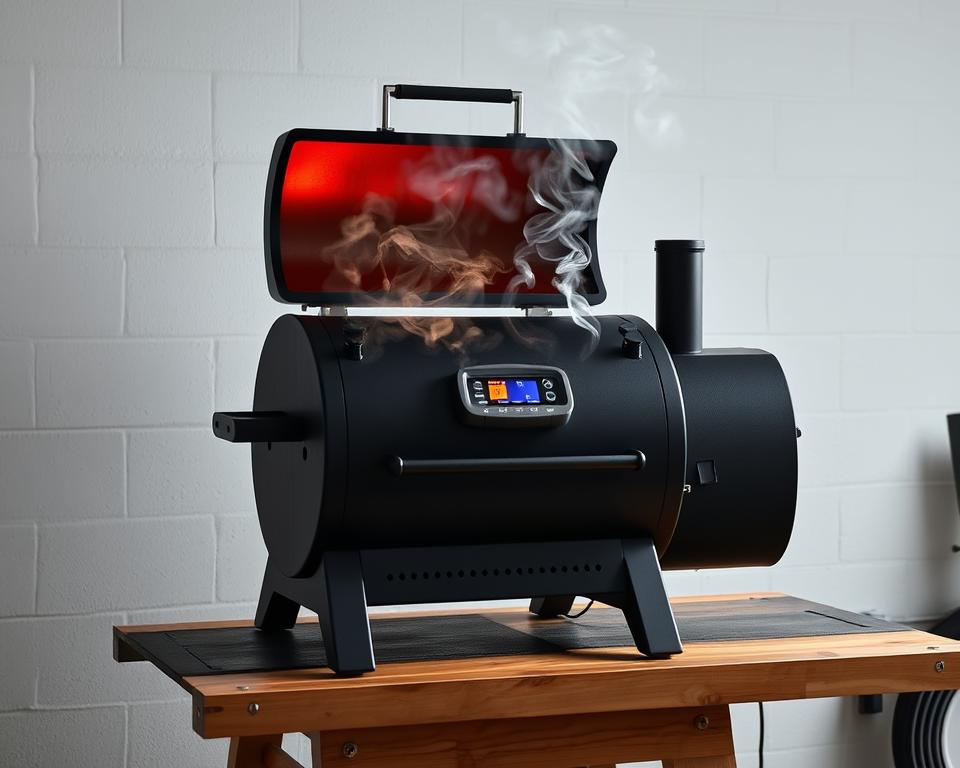
Why Your Pellet Grill Keeps Shutting Off Mid-Cook
Interpreting Power Fluctuations and Control Settings
Power fluctuations are a common reason for unexpected shutdowns. When the electricity supply is unstable, the grill’s safety mechanisms may activate, causing it to turn off. For example, a brief outage under 30 seconds might not extinguish the fire, but longer interruptions can require a full restart4.
Why Your Pellet Grill Keeps Shutting Off Mid-Cook, I haven’t ever had that happen to my pellet grill. I clean my grill every time I use it. Modern pellet grills often have control settings designed to handle these situations. Brands like Z Grills use automated pellet delivery systems to reignite the fire after power is restored. This ensures the temperature remains consistent, even during minor interruptions4.
Short Power Outages Versus Longer Interruptions
Short outages, lasting less than 30 seconds, are less likely to disrupt the cooking process. The smoker can often recover without user intervention, thanks to built-in safety features. However, longer interruptions can extinguish the fire, requiring a manual restart4.
Environmental factors, such as humidity, can also affect performance. Damp pellets may swell and jam the auger, leading to shutdowns. Storing pellets in a dry place and using high-quality fuel can prevent these issues5.
By understanding these dynamics, users can better prepare for and respond to power-related disruptions during a cook.
Troubleshooting and Restarting Your Pellet Grill
Experiencing a sudden shutdown during a cook can be both confusing and inconvenient. Knowing how to troubleshoot and restart the smoker effectively can save time and ensure a seamless cooking experience. Whether the interruption is brief or extended, following the right steps is crucial.
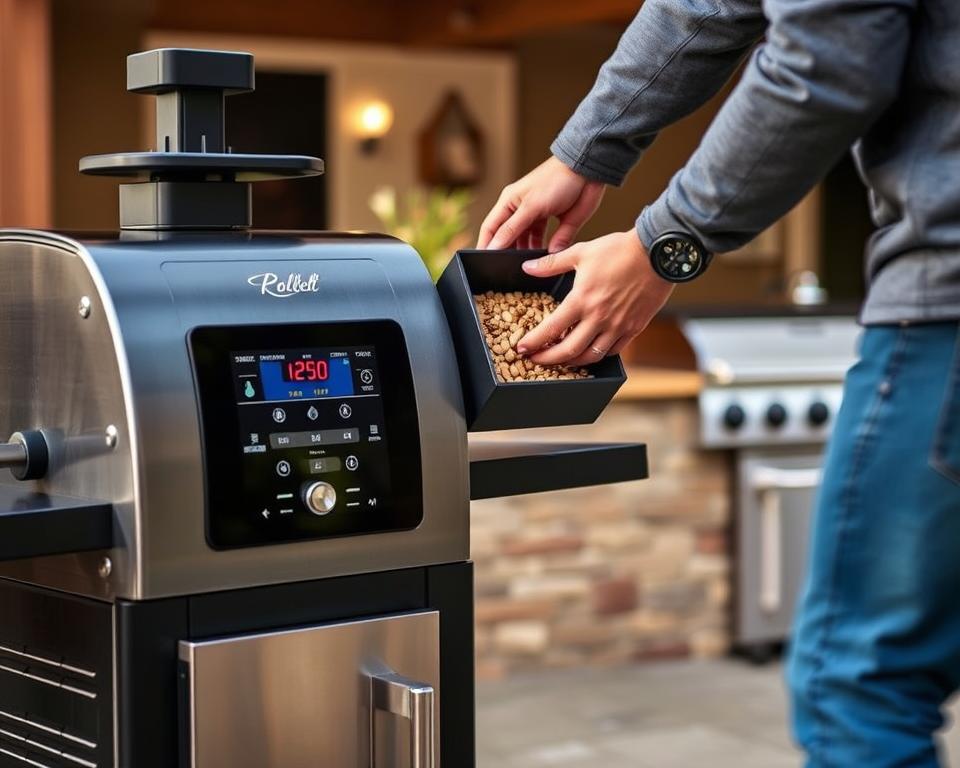
Why Your Pellet Grill Keeps Shutting Off Mid-Cook
Step-by-Step Restart Process: Short-Off and Long-Off Scenarios
For short power outages (less than 30 seconds), the smoker can often recover automatically. However, longer interruptions may require manual intervention. Begin by turning the controller from shutdown to smoke mode. This allows the system to reignite the fire and stabilize the temperature6.
If the outage lasts longer, open the lid to increase airflow. This helps the fire reignite more efficiently. Wait for the fan cycle to complete before attempting a restart. This ensures the system is ready to operate safely7.
Clearing the Fire-Pot and Removing Ash for a Safe Restart
Ash buildup can prevent proper ignition. If no fire is detected after several minutes, clear the fire-pot. Remove any accumulated ash to ensure proper airflow. This step is essential for a successful restart8.
Regular maintenance, such as cleaning the fire-pot, can prevent future shutdowns. It also improves the overall performance of the smoker.
What to Do When No Fire Is Detected
If the fire fails to ignite, inspect the auger and pellet feed. Damp pellets can swell and cause jams, disrupting the process. Ensure pellets are stored in a dry place to avoid this issue8.
Additionally, check the igniter and connections. A faulty igniter can halt the heating process. Replacing or repairing it may be necessary to resolve the problem6.
By following these steps, users can not only restart their smoker but also diagnose underlying issues causing the shutdown. This ensures smoother and more reliable cooking sessions in the future.
Conclusion
Maintaining a smooth cooking experience with your smoker requires understanding its mechanics. Unexpected shutdowns often stem from power fluctuations, pellet feed issues, or temperature spikes. By addressing these factors, users can prevent interruptions and enjoy consistent performance.
Proper troubleshooting is key. Ensure stable power by using the right extension cord and storing pellets in a dry place. Regular cleaning of the fire-pot and auger prevents ash buildup and jams, ensuring seamless operation.
Follow the detailed restart process if a shutdown occurs. Monitor the grill’s performance during cooking to catch potential issues early. Being informed and proactive ensures uninterrupted sessions with your pellet smoker.

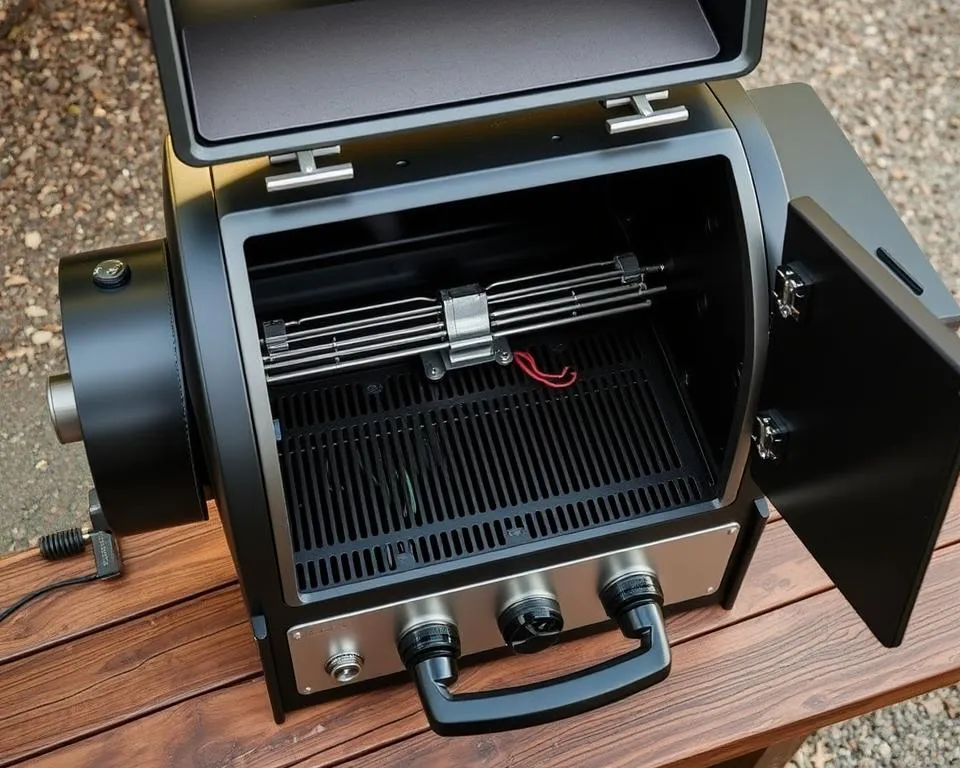
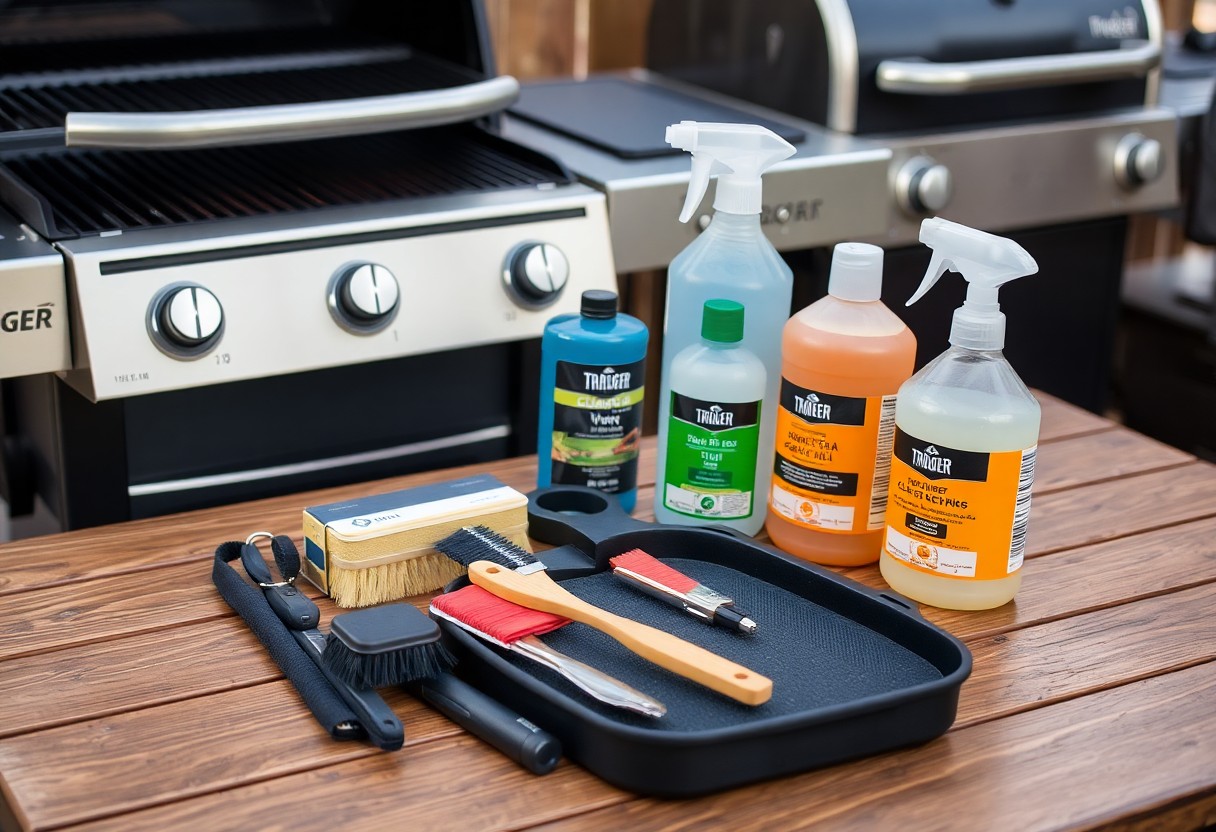
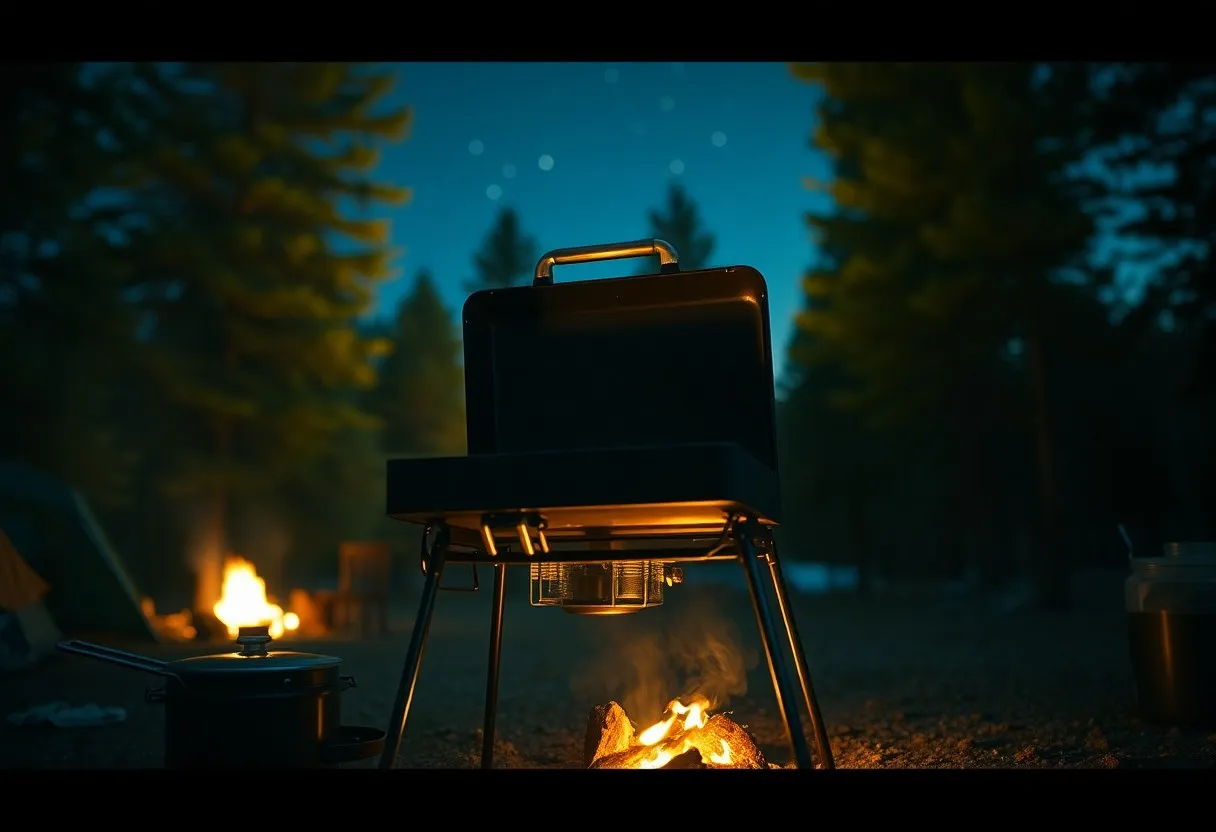
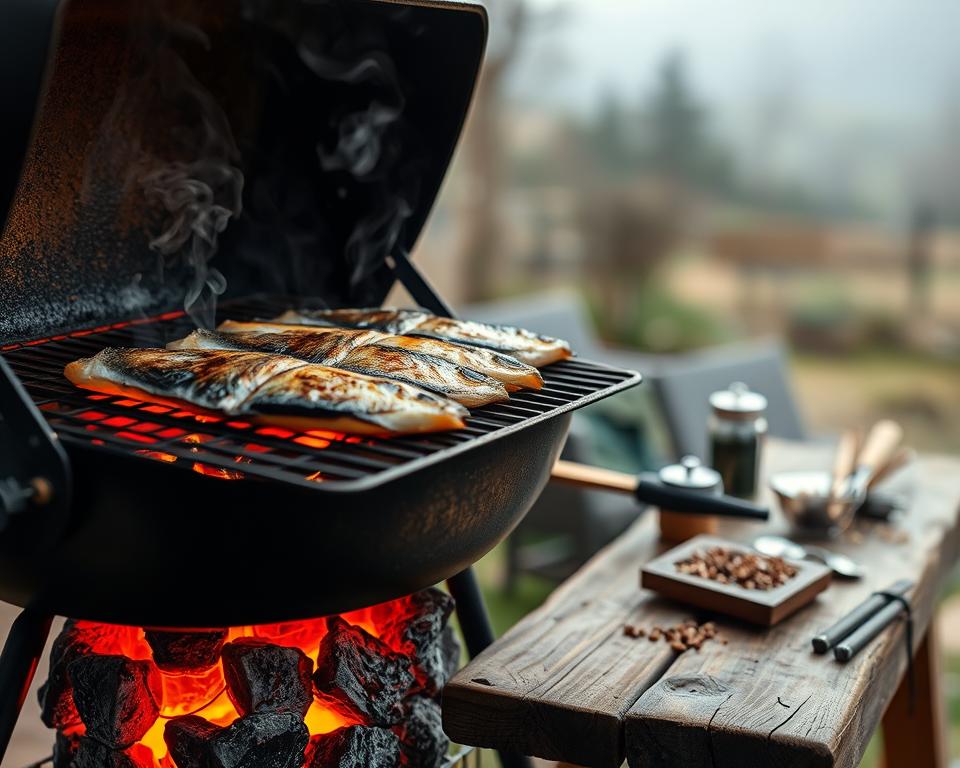
Leave a Reply